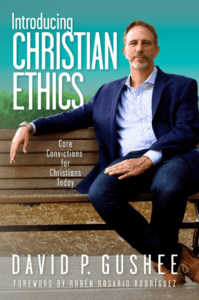A faith uninformed by Christian ethics can leave individuals and churches spiritually and morally adrift and susceptible to extreme ideologies, David Gushee said during a Feb. 17 Baptist News Global webinar.
“I am seeing a fundamentalist religion with so many holes in it, and with so much absolutist talk, that when it blows up for people, they are left free falling,” Gushee said during the hour-long discussion of his soon-to-be-released book, Introducing Christian Ethics: Core Convictions for Christians Today.
 He spoke with BNG Executive Director Mark Wingfield about the importance of core ethical convictions that he believes to be better options than the “anything goes” attitude of the far left and the narrow fundamentalism of the far right.
He spoke with BNG Executive Director Mark Wingfield about the importance of core ethical convictions that he believes to be better options than the “anything goes” attitude of the far left and the narrow fundamentalism of the far right.
When grounded in the “central norms” discernable in the history of Christian ethical thought — truthfulness, sacredness, justice, love, forgiveness — Christians can avoid the “ideological captivity” of evangelical loyalty to Donald Trump’s Make America Great Again movement, said Gushee, professor of Christian ethics at Mercer University and author of numerous books, including After Evangelicalism: The Path to a New Christianity.
“One way you get to MAGA-Trumpist Christianity is by being totally ignorant of the mainstream Christian tradition around the world,” he said.
While eschewing the Trumpist-evangelical coalition, Gushee said it is not his desire to throw out all conviction. He noted that a typographical error in the original title for the webinar — it was listed as a “change-making conservation” instead of a “change-making conversation” — would have been a good description of the book. He hopes to conserve historic Christian ethical values — which are not largely the values of Trumpism.
“I believe people cannot float free. They need convictions they can build their lives around,” he said.
Teaching and preaching convictions such as the sacredness of life and the importance of justice, love, truth and covenant could create a counterweight to the “pretty thin gruel” some churches offer in response to the left-right arguments dividing congregations, Gushee said. “I don’t understand Christianity without convictions, but sometimes it just involves deconstructing convictions we were once taught were essential,” including the inerrancy of scripture and the subordination of women.
Since writing After Evangelicalism, Gushee said, he has heard from a lot of people undergoing a deconstruction of their faith as they emerge “on the other side of disillusionment.”
“We don’t know what church is anymore and we don’t know what theology is anymore.”
“We don’t know what church is anymore and we don’t know what theology is anymore. We don’t know who Baptists are anymore and we don’t know what it means to be Christian anymore.”
It’s crucial that those disappointed with the politicization of faith seek meaning and solace in values informed by Christian ethics and tradition, he added.
To aid that conversation, Introducing Christian Ethics was written to help scholars, seminarians, clergy and laypeople navigate the challenges of “a post-evangelical, post-Southern Baptist, post-everything else space.”
The book covers the methods, traditions, themes, norms and Scripture that define Christian ethics and applies them to contemporary issues such as abortion, patriarchy, politics, white supremacy and marriage.
The text also demonstrates how moral reasoning can be situated not just in Scripture, but also in tradition and human thought. “I think this can be made accessible to people and it needs to be woven into everything we do,” Gushee said.
One of the dangers he cited is when Christians appeal to a single Scriptural text devoid of context. He cited the common use of Romans 13 to preach and teach on obedience to authorities, including when war or criminal justice are being considered.
Taken alone, the passage often is interpreted to support authoritarianism and violence, conclusions that can be avoided with a more thorough study of Hebrew and Christian Scriptures, he explained. This also means admitting that biblical texts are often in contention with each other.
But Scripture may not be the only needed source of information when considering an issue, Gushee said, because Scripture doesn’t address all modern issues. Rather, Christians should seek to integrate tradition and moral reasoning with biblical teaching.
Wingfield asked Gushee to comment on his perspective as someone who worships regularly with both Baptist and Catholic congregations. Gushee noted the well-established social and ethical teachings of the Catholic Church as a positive influence.
Catholic ethicists, he said, rely heavily on social justice and ethical traditions that date back centuries.
“Baptists have a great ethical tradition too, but it is far less explicit,” he said, noting that Baptists and other Protestants usually lean much more heavily on their own interpretation of the Bible. The result is a message that is “more likely to be undisciplined” and “swept up in emotionality.”
“Anti-democratic authoritarian religion is on the march in many parts of the world, and demagogue politicians who know how to play those notes are having success as well.”
That, in turn, makes churches and denominations much more susceptible to “a collapse of theology into politics” and to be “swept up by ideology,” Gushee said.
While this can happen in liberal and conservative churches alike, the modern influence on the right has been the politicization of evangelicalism, he said. “The Trumpification of white evangelicalism has cost them credibility and adherents.
But this also fits a larger pattern, added Gushee, who also teaches at International Baptist Theological Seminary in Amsterdam.
“Anti-democratic authoritarian religion is on the march in many parts of the world, and demagogue politicians who know how to play those notes are having success as well.”
Watch the entire webinar here.
Related articles:


